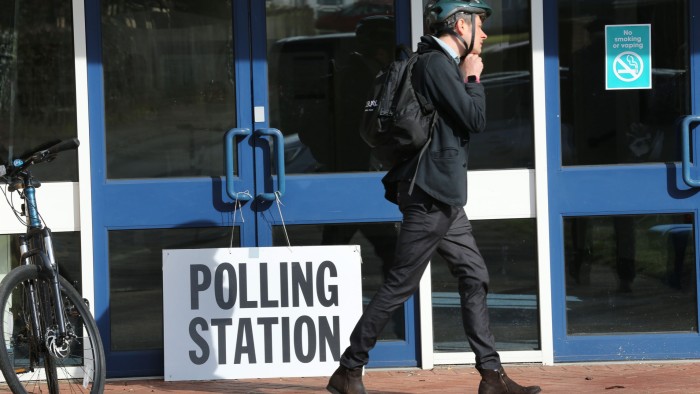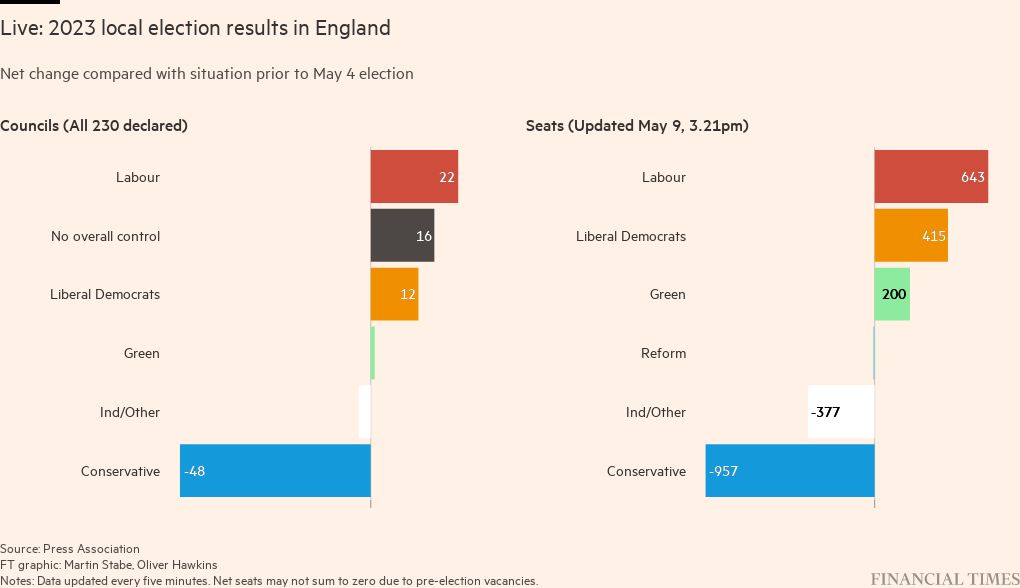Local elections uncertainty as early results show heavy Conservative losses

Roula Khalaf, Editor of the FT, selects her favourite stories in this weekly newsletter.
This article is an on-site version of our Inside Politics newsletter. Sign up here to get the newsletter sent straight to your inbox every weekday. If you’re new to the FT you can sign up to Inside Politics for free for 90 days.
Good morning. The people have spoken, but what they’ve said isn’t yet entirely clear. Most votes in the local elections are still being counted and we still only have a partial picture. What we can say is that it has been a very bad night for the Conservative party. What’s less clear is what it means for everyone else. Some more thoughts on that in today’s note.
Inside Politics is edited today by Leah Quinn. Follow Stephen on Twitter @stephenkb and please send gossip, thoughts and feedback to insidepolitics@ft.com
Something is happening but we don’t know what it is
When Greg Hands took post as Conservative party chair, the election, he told aides, that they should think of was 2015: a narrow majority, won in defiance of the polls.
Part of that was simply about good management: the Tory triumphs in 1992 and 2015 are part of the party’s internal mythos and they raise Conservative spirits whenever things look bleak.
But one important commonality between those elections is that while they were surprising given the state of the opinion polls, they were not that surprising given the state of the parties in the local elections that took place the previous year. In 1991, Neil Kinnock’s Labour party was just three points ahead of John Major’s Conservatives. In 2014, Ed Miliband’s was just two points ahead.
Although there are many, many, many results still to come, one thing we can say with a reasonable degree of certainty is that the Conservative party is doing much worse than in 1991 or 2014.
Thus far, the Tory performance is not what a governing party hoping to win an unexpected election victory in a year’s time would hope for. But the Labour performance is not what an opposition party hoping to win an election would hope for either.
Both parties can expect to do better than this in absolute terms. The governing party, regardless of circumstances, tends to recover some lost ground in the run-up to a general election. This is one of the most robust findings in political science, though we don’t know as much about why this is as we would like.
And the Labour party tends to do better at general elections than local elections, while the Liberal Democrats tend to do a little bit worse. I think there is a pretty obvious explanation for this: Labour, the larger party, is the challenger to the Conservatives in many more seats in the first past the post system at Westminster and squeezes more tactical votes out of the Liberal Democrats as a result. The Liberal Democrats do the same, but they are the Conservative challenger in far fewer seats.
Looking at the results we have thus far, if the Green party vote behaves in much the same way as the Liberal Democrat one does, this has been a very good set of elections for the Labour party. But I don’t know if the Green party’s voters will behave in the same way as Liberal Democrat voters do: none of us do!
From travelling around the country talking to people and asking for election leaflets wherever I go (and the many leaflets that Inside Politics readers have helpfully emailed to me) it is pretty clear that the Green party is borrowing extensively from the Liberal Democrat playbook in terms of its election material on the ground. Meeting these voters I would say they are broadly a much of a muchness, with the important caveat that the most committed Liberal Democrat voters I have met tend to have a negative opinion of Jeremy Corbyn and Green voters a positive one.
But in the air war on TV and radio, Liberal Democrat politicians sound much friendlier towards the Labour party (and vice versa) than Green politicians do about Labour (and again, vice versa). That will surely have some effect on how voters behave.
What we can say from these results thus far is that the Conservative party is not where it would want to be in terms of pulling off a 1992-style victory, and Labour is not where it would want to be as far as the question of winning a parliamentary majority is concerned.
My sense, just eyeballing the results we have so far, is that we are heading for a result that looks a bit like the 2010 general election.
But I’ll have far more to say about that next week, when we should know much more about these results than I do this morning.
Now or NEVer?
A brief note on methodology. As I’ve said before, the numbers that really matter in terms of understanding this election are the ones that will be spat out by the political scientists on the BBC and Sky: the ones that simulate what the results would have been had voting taken place across the whole country.
The BBC’s team produces the PNS — projected national share — while for Sky and the Sunday Times, we have the NEV — national equivalent vote. Now, these metrics spit out slightly different numbers from one another, though neither has been consistently better or worse. At time of writing, they are producing quite sharply different scores.
What’s the reason for the discrepancy? Well, because neither team’s calculations are based on all 8,000 seats that are up for grabs. They are sampling from them, and sometimes this produces quite different results.
Given that both numbers are perfectly reasonable, my advice to readers following these elections is to pick the one that makes you happiest and to have the best possible weekend.
Now try this
I spent the small hours of the morning at the BBC as part of its radio election coverage. (Apologies to those of you who were listening along, for whom much of this email will be covering similar ground.)
Before that, I had a lovely evening listening to the Attacca Quartet at Kings Place yesterday. They played a wonderfully eclectic set of music old and new: string quartets by Maurice Ravel and John Adams, a wonderful composition by Caroline Shaw and pieces from their record Real Life. Kings Place’s ‘Sound Unwrapped’ programme really is very wonderful. The quartet’s music is available to try wherever you stream or listen.
Top stories today
Steep Tory losses flow in | Early results suggest the Tories could lose as many as 1,000 seats compared with their pre-election standing, exceeding even the most pessimistic projections.
RMT votes to extend strike | Strike action looks set to continue across the British rail network as the RMT wins a further six-month mandate.
Backtrack on voter ID | UK ministers plan to expand on the types of photo identification that voters can present at polling stations in future after reduced participation in English local elections.

Comments